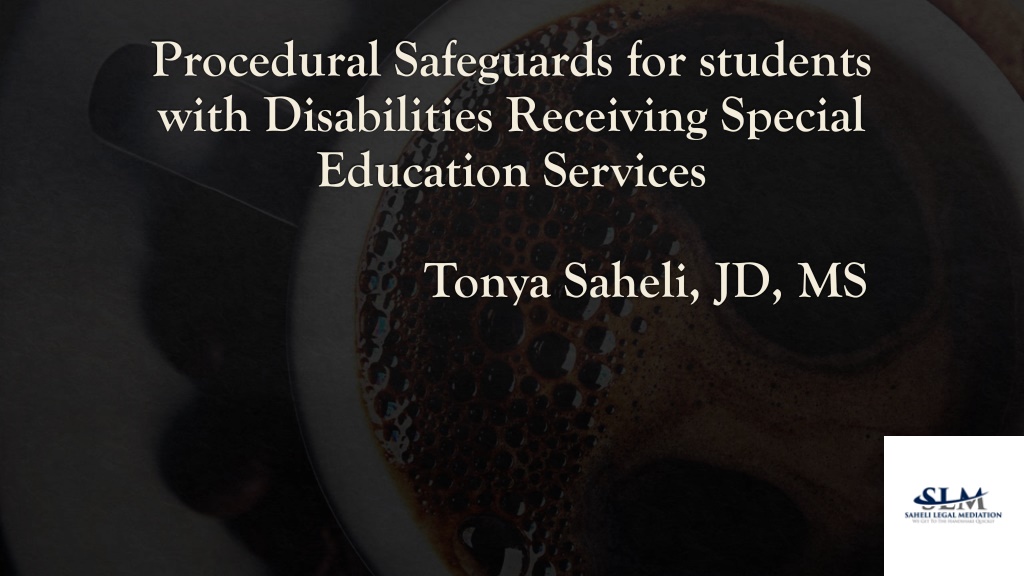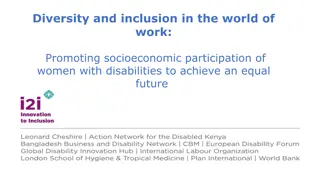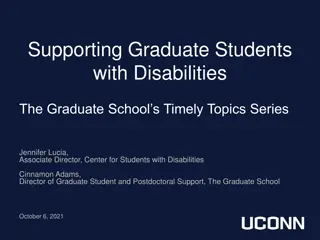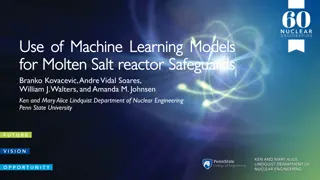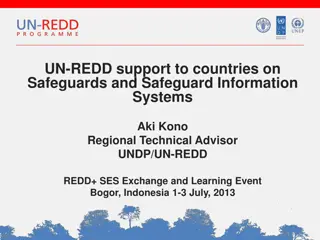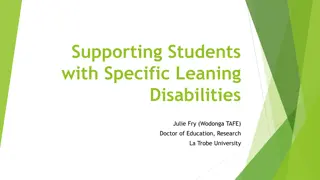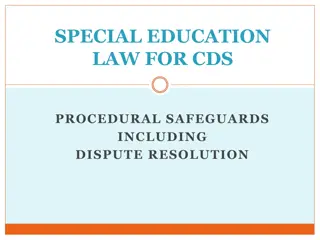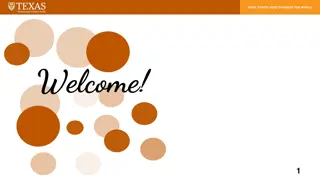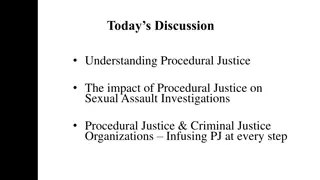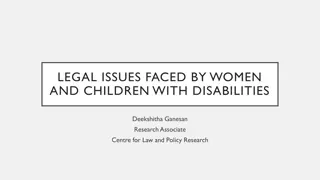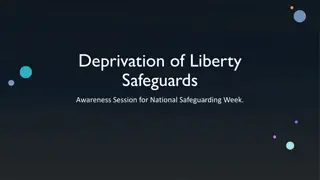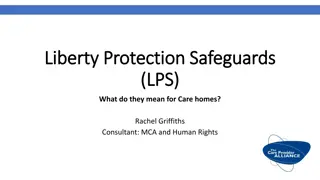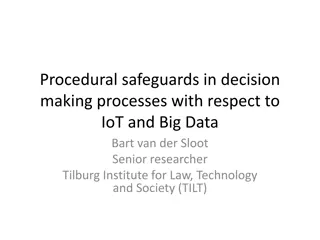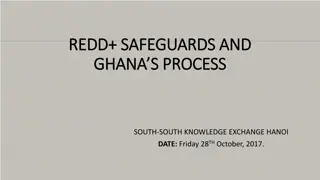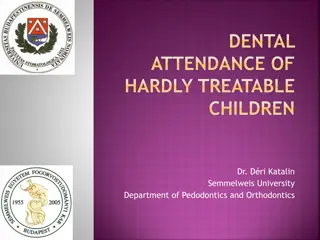Understanding Procedural Safeguards for Students with Disabilities
This information delves into the procedural safeguards for students with disabilities receiving special education services, covering topics such as laws governing procedural safeguards, parents' rights and responsibilities, abbreviation glossary, and the required Notice of Procedural Safeguards under the Individuals with Disabilities Education Act. It provides insights for parents, legal guardians, and surrogate parents on their educational rights, including when the notice must be provided and key aspects related to special education services.
Download Presentation

Please find below an Image/Link to download the presentation.
The content on the website is provided AS IS for your information and personal use only. It may not be sold, licensed, or shared on other websites without obtaining consent from the author. Download presentation by click this link. If you encounter any issues during the download, it is possible that the publisher has removed the file from their server.
E N D
Presentation Transcript
Procedural Safeguards for students with Disabilities Receiving Special Education Services Tonya Saheli, JD, MS
Overview of Training 01 02 03 What are procedural safeguards? What laws govern Procedural Safeguards? What should you think of when you hear the term procedural safeguards ? What exactly are parents rights and responsibilities in California Special Education?
Abbreviation Glossary ADR: Alternative Dispute Resolution CFR: Code of Federal Regulations EC: California Education Code FAPE: Free Appropriate Public Education IDEA: Individuals with Disabilities Education Act IEP: Individualized Education Program OAH: Office of Administrative Hearings SELPA: Special Education Local Plan Area USC: United States Code
What laws Govern Procedural Safeguards Procedural Safeguards are outlined under Federal and State laws (20 United States Code Section 1412[d]; 34 CFR 300.504; and California Education Code sections 5631[d][2]. 56321, and 56341.1[g][1]
Procedural Safeguards This information provides you as parents, legal guardians, and surrogate parents of children with disabilities from three (3) years of age through age twenty-one (21) and students who have reached age eighteen (18), the age of majority, with an overview of your educational rights or procedural safeguards. \
The Notice of Procedural Safeguards is required under the Individuals with Disabilities Education Act (in English, referred to as IDEA) and must be provided to you: When you ask for a copy The first time your child is referred for a special education assessment Each time you are given an assessment plan to evaluate your child Upon receipt of the first state or due process complaint in a school year, and When the decision is made to make a removal that constitutes a change of placement (20 USC 1415[d]; 34 CFR 300.504; EC 56301[d] [2], EC 56321, and 56341.1[g] [1])
What is the Individuals with Disabilities Education Act (IDEA)? IDEA is a federal law that requires school districts to provide a free appropriate public education (in English, referred to as FAPE) to eligible children with disabilities. A free appropriate public education means that special education and related services are to be provided as described in an individualized education program (known as IEP) and under public supervision to your child at no cost to you.
What should you think of when you hear the term procedural safeguards ? You should think of parent s rights. This term is synonymous with parent s rights. As long as states follow the overall process in IDEA, they have leeway to determine some of the details. Recall that the IDEA is a federal law. Thus, state laws cannot contradict it, and they cannot even be less stringent, but they can be even more strict than the IDEA. California s laws around IDEA likely differ from other jurisdictions. What does this mean? It means that if you have a friend or family member in a different state who has a child who has an IEP, their procedural safeguards may not look like the procedural safeguards that you have received so be careful when comparing notes with other jurisdictions.
Lets be Honest How many of you read the Procedural Safeguards when they are provided to you? Raise your hand?
Guess what? You should always read the procedural safeguards each time they are provided.
Exercise- 5 minutes I am going to break you out into groups. I want you to answer the following questions in your group: 1. Define what procedural safeguards are in your own words 2. How many procedural safeguards are mentioned in the list that is provided in the CA Education Code. 3. Name at least 5 procedural safeguards that are listed in the CA Education Code.
What exactly are parents rights and responsibilities in California Special Education? Parent and Students over the age of eighteen have the right 1. To Participate 2. To Receive Prior Written Notice (PWN) 3. To Consent 4. To Refuse to Consent 5. To Be Given a Nondiscriminatory Assessment 6. To Receive Independent Educational Assessments 7. To Access Educational Records 8. To Stay in the Current Program if There is a Disagreement About Placement 9. To Be Given a Hearing Regarding Disagreements About an IEP 10. To Receive Mediation 11. To File a Complaint Against Your School District 12. To be Informed of School Discipline and Alternative Placement 13. To be Informed of Policies Regarding Children Who Attend Private Schools
To Participate Parents are a part of the IEP team. Parents have the right to refer their child for special education services, to participate in the development of the IEP and to be informed of all program options and alternatives, both public and nonpublic.
To Participate You must be given opportunities to participate in any decision-making meeting regarding your child s special education program. You have the right to participate in IEP team meetings about the identification (eligibility), assessment, or educational placement of your child and other matters relating to your child s FAPE. (20 USC 1414[d] [1]B [d][1][D]; 34 CFR300.321; EC 56341[b], 56343[c]) The parent or guardian, or the local educational agency (LEA), has the right to participate in the development of the IEP and to initiate their intent to electronically audiotape the proceedings of the IEP team meetings. At least 24 hours prior to the meeting, the parent or guardian shall notify the members of the IEP team of their intent to record a meeting. If the parent or guardian does not consent to the LEA audiotape recording an IEP meeting, the meeting shall not be recorded on an audiotape recorder. Your rights include information about the availability of FAPE, including all program options, and all available alternative programs, both public and nonpublic. (20 USC 1401[3], 1412[a][3]; 34 CFR 300.111; EC 56301, 56341.1[g][1], and 56506)
To Receive Prior Written Notice (PWN) Parents have a right to receive prior written notice, in their native language, when the school district initiates or refuses their request to initiate a change in their child s identification, assessment, or educational placement in special education.
To Consent Under both the IDEA and CEC, parents must provide informed, written consent before their child is assessed or provided with any special education services. Parental consent must also be provided before any change in special education services may occur. The district must ensure that parents understand proceedings of the IEP team meeting including arranging for an interpreter for parents with deafness or those whose native language is other than English. Note: Under federal law, new services may be implemented without consent, BUT under CA law, no new services can be implemented without parental consent. Recall that although CA cannot contradict or be less stringent than Federal Law, it can be more strict. This is an example of where CA law is more strict.
IDEA v. CEC Under the Individuals with Disabilities Education Act (IDEA), the school must ask for your consent at these times: 1. Before the school conducts an initial evaluation or a reevaluation of your child 2. Before the school provides services to your child for the first time through an IEP 3. Before inviting non-school agencies to participate in IEP meetings to discuss your child s transition to adult life. You must give permission in each situation above. For example, say you gave informed consent for an evaluation. Later, if the school wants to provide special education services, it must get your informed consent again. Keep in mind that California as a state and your local schools may have rules requiring informed consent at other times, as well. But right now I am speaking about IDEA and CA. If the school takes one of these actions without getting your consent, you have options. You can ask for due process or file a state complaint.
You also have the right to refer your child for Special Education Services You have the right to refer your child for special education services. You must give informed, written consent before your child s first special education assessment can proceed. The parent has at least fifteen (15) days from the receipt of the proposed assessment plan to arrive at a decision. The assessment may begin immediately upon receipt of the consent and must be completed and an IEP developed within sixty (60) days of your consent.
You also have the Right To Refuse to Consent If you do not provide consent for an initial assessment or fail to respond to a request to provide the consent, the school district may pursue the initial assessment by utilizing due process procedures. If you refuse to consent to the initiation of services, the school district must not provide special education and related services and shall not seek to provide services through due process procedures.
BUT, what happens when a parent refuses to consent to an assessment of their child in special education? If you consent in writing to the special education and related services for your child, but do not consent to all of the components of the IEP, those components of the program to which you have consented must be implemented without delay. This is referred to agreeing, with exceptions. If the school district determines that the proposed special education program component to which you do not consent is necessary to provide a free appropriate public education to your child, a due process hearing must be initiated. If a due process hearing is held, the hearing decision shall be final and binding. In the case of reevaluations, the school district must document reasonable measures to obtain your consent. If you fail to respond, the school district may proceed with the reevaluation without your consent. (20 USC 1414[a][1][D] and 1414[c]; 34 CFR 300.300; EC 56506[e], 56321[c] and [d], and 56346).
You Also Have the Right to Revoke Consent the If at any time subsequent to the initial provision of special education and related services, the parent of a child revokes consent in writing for the continued provision of special education and related services, the public agency: May not continue to provide special education and related services to the child, but must provide prior written notice in accordance with 34 CFR Section 300.503 before ceasing such services May not use the procedures in subpart E of Part 300 34 CFR (including the mediation procedures under 34 CFR Section 300.506 or the due process procedures under 34 CFR Sections 300.507 through 300.516) in order to obtain agreement or a ruling that the services may be provided to the child
Also, if you revoke consent, then the public agency Will not be considered to be in violation of the requirement to make a free appropriate public education (FAPE) available to the child because of the failure to provide the child with further special education and related services Is not required to convene an IEP team meeting or develop an IEP under 34 CFR Sections 300.320 and 300.324 for the child for further provision of special education and related services Please note, in accordance with 34 CFR Section 300.9 (c)(3), that if the parents revoke consent in writing for their child s receipt of special education services after the child is initially provided special education and related services, the public agency is not required to amend the child s education records to remove any references to the child s receipt of special education and related services because of the revocation of consent.
To Be Given a Nondiscriminatory Assessment Children must be assessed for special education through the use of methods that are not culturally biased or discriminatory. See The case of Larry P. The Larry P. v. Riles (Larry P.) case was filed in 1971 when five African-American children who had been placed in special education classes for the educable mentally retarded (EMR) in the San Francisco Unified School District filed suit in the Federal District Court of Northern California claiming that they had been wrongly placed in the EMR classes based on their performance on intelligence tests that were racially biased and discriminatory. [Larry P. v. Riles, 495 F. Supp. 926 (N.D. Cal. 1979).] The suit also claimed that a disproportionate total number of African-American students were placed in EMR classes compared to the number of African-American students in the school system.
To Be Given a Nondiscriminatory Assessment continued.. The Court decided in favor of the students, and the District was prohibited from using IQ tests to identify or place African-American students in EMR-type classes. The Decision was upheld on appeal in 1984. [Larry P. v. Riles, 793 F.2d 969 (9th Cir. 1984).] The Court expanded its ruling in the case by banning the use of IQ testing for all African-American students who have been referred for special education services. The federal district court case of Crawford v. Honig prompted a reexamination of the rights of multicultural children in special education. This case has challenged the Larry P. ruling banning the use of IQ tests for African-American children and has, preliminarily, resulted in three African-American children being allowed to take IQ tests because their parents wish to have them do so. After the Ninth Circuit Court of Appeals affirmed Crawford, CDE issued a Legal Advisory in October 1994, continuing the directive which banned IQ testing. [See Crawford v. Honig, 37 F.3d 485 (9th Cir. 1994).]
To Receive Independent Educational Assessments If parents disagree with the results of the assessment conducted by the school district, they have the right to ask for and obtain an independent educational evaluation (IEE) at public expense. The parent is entitled to only one IEE at public expense each time the public agency conducts an evaluation with which the parent disagrees. When a parent requests an IEE at public expense, the school district must, without unnecessary delay, either ensure that an IEE is provided at public expense, or request a due process hearing if the district believes their assessment was appropriate and disagrees that an IEE is necessary. The school district also has the right to establish the standards or criteria (including cost and location) for IEEs at public expense
Exercise Your child s school district conducted an assessment of your child and you disagree with the results of the assessment conducted by the school district. You would like to have an independent educational assessment conducted for your child, but you cannot afford it. What are your rights around this? Discuss
To Access Educational Records Parents have a right to inspect, review, and obtain copies of their child s educational records.
To Stay in the Current Program if There is a Disagreement About Placement (Stay Put) If parents disagree with the district regarding their child s special education placement or a proposed change in placement, the law requires the student to stay put in the current program until the dispute is resolved.
To Be Given a Hearing Regarding Disagreements About an IEP Parents have the right to present a complaint relating to the provision of a FAPE for their child; to have an attorney, an advocate, and the student, if appropriate, present at the due process hearing; and to make the hearing public. Under certain conditions, the hearing officer may award, reduce, or deny the reimbursement of attorneys fees and fees paid to nonpublic institutions by parents in the settlement of a case. To request a due process hearing or to receive a complete notice of procedural safeguards related to a due process hearing, contact the Office of Administrative Hearings.
To Receive Mediation Parents are encouraged to consider settling disagreements regarding their child s special education program through voluntary mediation, a process through which parties seek mutually agreeable solutions to disputes with the help of an impartial mediator. Mediation is available for: 1.Mediation of State Complaint - the California Department of Education is required to offer mediation to the parent or the local educational agency (LEA) but both must agree, and participation is voluntary. 2.Office of Administrative Hearings (OAH) Mediation Only - Parent or LEA may file for OAH mediation only. Participation is voluntary. Parents may seek mediation alone or separate from due process, or they may participate in mediation pending a due process hearing. Mediation cannot be used to delay parents right to a due process hearing.
ADR Services Your local school district may also offer something called Alternative Dispute Resolution (ADR), which can happen even before mediation and due process. It is a process where a neutral 3rdparty helps facilitate an IEP or a conversation between the parent and members of the SPED team. Check with your district regarding these services.
To File a Complaint Against Your School District If parents believe their child s school district has violated the law, they may file a complaint with the California Department of Education. The Department must investigate complaints alleging violations of noncompliance with IDEA, state special education laws, or regulations, and issue a written report of findings within 60 days of receiving the complaint.
To be Informed of School Discipline and Alternative Placement There are specific rules regarding the suspension and expulsion of students with IEPs. Generally, a student with a disability may be suspended or placed in an alternative educational setting to the same extent that these options apply to students without disabilities. If the student with a disability is in such a placement for more than ten days, an IEP meeting must be held to consider the appropriateness of the child s current placement and the extent to which the disability is the cause of the misconduct. Regardless of the child s placement, the district must provide FAPE
To be Informed of Policies Regarding Children Who Attend Private Schools School districts are responsible for identifying, locating and assessing students with disabilities enrolled in private schools by their parents. However, school districts are not required to provide special education or related services to these students. There is no entitlement for services, though some private schools and students attending private schools may receive some services from the school district. The reauthorization of IDEA in 2004 and the subsequent 2006 IDEA regulations significantly changed the obligation of States and local education agencies (LEAs) to children with disabilities enrolled by their parents in private elementary and secondary schools. 612 (a) (10) (A) of the Act and 34 CFR 300.130 300.144 require LEAs, in which the private schools are located, conduct child find and provide equitable services to parentally-placed private school children with disabilities.
Who should contact about an IEP concern? When you have a concern about your child s education, it is important that you contact your child s teacher, content specialist or administrator to talk about your child and any problems you see. Staff in your school district or special education local plan area (SELPA) may answer questions about your child s education, your rights, and procedural safeguards. Also, when you have a concern, this informal conversation often solves the problem and helps to maintain open communication. You may also want to contact one of the California parent organizations (Family Empowerment Centers and Parent Training Institutes), which were developed to increase collaboration between parents and educators to improve the educational system. Contact information for these organizations is found on the CDE special education California Parent Organizations Web Page .
Thank You! References 1. 20 United States Code Section 1412[d]; 34 CFR 300.504; and California Education Code sections 5631[d][2]. 56321, and 56341.1[g][1] 2. www.cde.ca.gov 3. If you have Questions contact the Procedural Safeguards Referral Service | speceducation@cde.ca.gov | 800-926-0648
DO NOT DUPLICATE WITHOUT PERMISSION Please do not duplicate this slide deck without the express written permission od Saheli Legal Mediation. c/o 2022 For more information, please contact Saheli Legal Mediation at tonya@mediationofficesoftonyasaheli.com 415-625-3119
